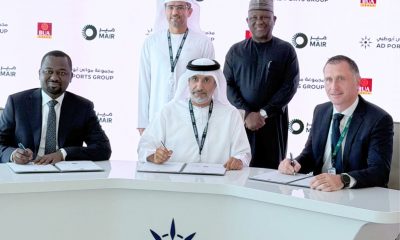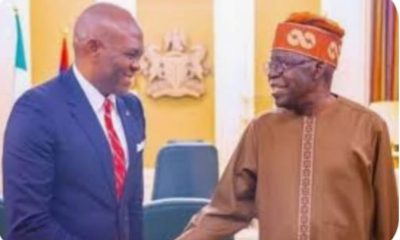Business
Okpala:Debt utilisation must support actual economic growth

OKPALA:Debt utilisation must support actual economic growth
Group Managing Director, VFD Group Plc, Nonso Okpala, presides over an expansive financial conglomerate with expertise across many sectors. Okpala, a well-rounded finance and economic expert, in a recent interview speaks on Nigeria’s macroeconomic outlook, financial markets and business development.
What are the key variables that will shape the economic space in the second half, especially the financial markets?
OKPALA:Following the recession witnessed in third quarter 2020, the economy has recorded two consecutive quarters of economic growth, albeit marginal.
Two major factors have heavily influenced the economic conversation in first half 2021 are inflation and exchange rate. These will remain a key factor for the rest of the year. In second half, we expect a likely increase in headline inflation, followed by the growing trend of higher interest rate across most money market instruments, including treasury bills.
In the capital market, we have seen some progress with the implementation of the demutualisation. However, factors such as naira stability, earnings performances of key players and government policy would be crucial for market growth, especially towards attracting and retaining foreign investors.
We’ve seen a continuing decline in foreign portfolio investments. What is responsible for this and how do we make Nigeria the preferred destination among emerging markets?
The decline in foreign investments could be attributed to the condition of Nigeria’s economic and business space, as well as the security challenges, socioeconomic uncertainties associated with the COVID-19 pandemic, negative macroeconomic indices and mismatch in policies that have failed to give direction.
Huge concerns around foreign exchange (forex) liquidity, capital repatriation, rising inflation and the deterioration in the macro-environment have also dampened the appetite of foreign portfolio investors. In addition, the Nigerian Exchange (NGX) and mutual funds both recorded bearish performances with the NGX All Share Index on negative yield between January and June and only 25 out of 118 listed mutual funds posting growth in the first quarter 2021.
A possible increase in foreign inflow will be supported by the combination of significant improvement in operating environment and the capital market, relative stability in the foreign exchange market, improved security conditions and deliberate government policies that impacts ease of doing business.
Are we likely to see a rebound in the equities market in the second half?
The equities market is not reflecting impressive corporate earnings or a continuous uptick in fixed income enough to weigh on the market. However, a decline in inflation and a convergence of forex rates and forex stability in second half will boost investor confidence and improve foreign portfolio investments in the equities sector. Those are a few of the conditions that will indicate whether a recovery will occur for NGX ASI, although some sectors are already seeing positive year-to-date performance. In addition, the SEC is working on various initiatives which we are hopeful would increase local participation in the market.
What sectors do you think investors should look out for?
Across Africa, we have seen accelerated investments in financial technology. This trend would remain the same given the maturity stage we are in and the vast market that remains to be captured.
Real estate is a viable investment sector. A gradual shift into property-tech and rejig of the housing model to increase investment yield and rental yield is required to accelerate growth.
Other sectors to look at include telcos, food and beverages and travels and tourism especially as the world economy comes to a full reopening and travel restrictions are lifted.
Access to finance is still a major issue for individuals and businesses, especially small and medium enterprises (SMEs), how do we improve access to finance? And what is your Group doing about this?
This remains a challenge, especially in developing and underdeveloped countries.
Along the value chain of our businesses, we have different initiatives and products that helps address this. For individuals, this is purely technology-focused. We have built a virtual banking solution that eliminates barriers and reduces the cost and time of accessing financing. In addition, we will continue to use data to understand our customers and provide them with risk-based credit access.
Within the Group’s portfolio companies, we have three entities with differentiated focus on creating access to credit for individuals and businesses, and emphasis on how important this is to us. We give loans to SMEs through our micro-finance bank while structured financing for larger corporates can be accessed from our bridge financing outfits. Hence, there is something for everyone.
Layered on this is our corporate banking portal which will be launched soon. In designing this, a large emphasis was placed on SMEs. Beyond financing, we are committed to providing end-to-end financial services and growth accelerators to business we work with.
What is your assessment of the first half economic performance, with emphasis on the financial markets?
The first half 2021 was a mix of outcomes. The country officially came out of recession in first quarter 2021, while we have seen strong resistance to the pandemic across some sectors with growth in key indicators, particularly in banking and telecoms. However, these gains remain limited tempered by rising inflation, declining foreign reserves and further naira depreciation across official and parallel windows.
In the financial markets, we witnessed rising interest rate for T-bills, bonds and fixed income instruments. The capital market, however, has witnessed a six per cent decline year to date
Micro-lending is a global tool for poverty alleviation and empowerment. What has been your experience?
We have been into micro-lending business since 2009 first with VFD Bridge using our Lagos State lending licence and now joined by our microfinance bank. From then till date, we have deepened our reach of clientele who can access micro-credit significantly. Particularly between 2019 and today, where we have grown from 3,000 customers to about 300,000, who can potentially access micro-credit on request. We have been able to provide credit to individuals and small businesses who, otherwise would not have had access to credit from mainstream financial institutions. This, in return, enables these businesses grow, while also creating more jobs for thousands of others.
That said, this is only one of the several means of poverty alleviation and the government needs to create more social programmes and an economic environment that ensures gains are sustained.
Nigeria’s national economic development programme revolves around diversification and job creation, what are your suggestions?
In addition to diversification of government revenue and job creation, bridging the infrastructure gap is also a front burner subject towards achieving our development goals. While the government continues to make progress in this regard, the pace of infrastructure needs to be sped up to achieve our goal.
Also, we have seen gradual decline in oil contribution to gross domestic product (GDP), with growth, especially in the agricultural sector. However, the future is technology. Even in our agricultural sector, growth accelerator from this sector would need investment in tools to increase mechanised farming and general produce efficiency. Still on technology, we saw the emergence of India in the 90s to 2000s as a major exporter of tech-based solutions, services and personnel. In today’s increasingly global village, we continue to see the ascendance of Nigerians in the tech and software development phase. Government policies need to fully support this budding area of expertise for job creation and economic value realisation.
What’s your view on Nigeria’s debts?
Our debt profile is on the rise, and this is well documented. The bigger challenge is our ability to generate revenue. In 2020, about 97 per cent of government revenue was used to service existing debt stock. Hence the focus in the future should be on how to enhance our revenue, and how future debt utilisation must support actual economic growth.
How much of a risk does the foreign exchange constitute to the markets and economy?
Considering the importance of foreign inflows to our financial markets, foreign exchange stability and availability is an important indicator for the market and our economy.
Investors need assurances that there will not be capital or interest gain erosion at repatriation point or worse case, scarcity of forex as we saw in 2016 when companies could not repatriate funds to home country.
This stability also has the potential to affect the prices of goods and services, especially for products in the manufacturing value chain that relies on imported raw materials. This, alongside the increasing cost of outrightly imported items, can lead to inflation, a scenario we also saw between 2016-2017, when “imported inflation” accounted for the upward trend in headline inflation.
Business
Nigeria’s Inflation Drops to 15.10% as NBS Reports Deflationary Trend

Nigeria’s headline inflation rate declined to 15.10 per cent in January 2026, marking a significant drop from 27.61 per cent recorded in January 2025, according to the latest Consumer Price Index (CPI) report released by the National Bureau of Statistics.
The report also showed that month-on-month inflation recorded a deflationary trend of –2.88 per cent, representing a 3.42 percentage-point decrease compared to December 2025. Analysts say the development signals easing price pressures across key sectors of the economy.
Food inflation stood at 8.89 per cent year-on-year, down from 29.63 per cent in January 2025. On a month-on-month basis, food prices declined by 6.02 per cent, reflecting lower costs in several staple commodities.
The data suggests a sustained downward trajectory in inflation over the past 12 months, pointing to improving macroeconomic stability.
The administration of President Bola Ahmed Tinubu has consistently attributed recent economic adjustments to ongoing fiscal and monetary reforms aimed at stabilising prices, boosting agricultural output, and strengthening domestic supply chains.
Economic analysts note that while the latest figures indicate progress, sustaining the downward trend will depend on continued policy discipline, exchange rate stability, and improvements in food production and distribution.
The January report provides one of the clearest indications yet that inflationary pressures, which surged in early 2025, may be moderating.
Bank
Alpha Morgan to Host 19th Economic Review Webinar

Alpha Morgan to Host 19th Economic Review Webinar
In an economy shaped by constant shifts, the edge often belongs to those with the right information.
On Wednesday, February 25, 2026, Alpha Morgan Bank will host the 19th edition of its Economic Review Webinar, a high-level thought leadership session designed to equip businesses, investors, and individuals with timely financial and economic insight.
The session, which will hold live on Zoom at 10:00am WAT and will feature economist Bismarck Rewane, who will examine the key signals influencing Nigeria’s economic direction in 2026, including policy trends, market movements, and global developments shaping the local landscape.
With a consistent track record of delivering clarity in uncertain times, the Alpha Morgan Economic Review continues to provide practical context for decision-making in a dynamic environment.
Registration for the 19th Alpha Morgan Economic Review is free and can be completed via https://bit.ly/registeramerseries19
It is a bi-monthly platform that is open to the public and is held virtually.
Visit www.alphamorganbank to know more.
Business
GTBank Launches Quick Airtime Loan at 2.95%

GTBank Launches Quick Airtime Loan at 2.95%
Guaranty Trust Bank Ltd (GTBank), the flagship banking franchise of GTCO Plc, Africa’s leading financial services group, today announced the launch of Quick Airtime Loan, an innovative digital solution that gives customers instant access to airtime when they run out of call credit and have limited funds in their bank accounts, ensuring customers can stay connected when it matters most.
In today’s always-on world, running out of airtime is more than a minor inconvenience. It can mean missed opportunities, disrupted plans, and lost connections, often at the very moment when funds are tight, and options are limited. Quick Airtime Loan was created to solve this problem, offering customers instant access to airtime on credit, directly from their bank. With Quick Airtime Loan, eligible GTBank customers can access from ₦100 and up to ₦10,000 by dialing *737*90#. Available across all major mobile networks in Nigeria, the service will soon expand to include data loans, further strengthening its proposition as a reliable on-demand platform.
For years, the airtime credit market has been dominated by Telcos, where charges for this service are at 15%. GTBank is now changing the narrative by offering a customer-centric, bank-led digital alternative priced at 2.95%. Built on transparency, convenience and affordability, Quick Airtime Loan has the potential to broaden access to airtime, deliver meaningful cost savings for millions of Nigerians, and redefine how financial services show up in everyday life, not just in banking moments.
Commenting on the product launch, Miriam Olusanya, Managing Director of Guaranty Trust Bank Ltd, said: “Quick Airtime Loan reflects GTBank’s continued focus on delivering digital solutions that are relevant, accessible, and built around real customer needs. The solution underscores the power of a connected financial ecosystem, combining GTBank’s digital reach and lending expertise with the capabilities of HabariPay to deliver a smooth, end-to-end experience. By leveraging unique strengths across the Group, we are able to accelerate innovation, strengthen execution, and deliver a more integrated customer experience across all our service channels.”
Importantly, Quick Airtime Loan highlights GTCO’s evolution as a fully diversified financial services group. Leveraging HabariPay’s Squad, the solution reinforces the Group’s ecosystem proposition by bringing together banking, payment technology, and digital channels to deliver intuitive, one-stop experiences for customers.
With this new product launch, Guaranty Trust Bank is extending its legacy of pioneering digital-first solutions that have redefined customer access to financial services across the industry, building on the proven strength of its widely adopted QuickCredit offering and the convenience of the Bank’s iconic *737# USSD Banking platform.
About Guaranty Trust Bank
Guaranty Trust Bank (GTBank) is the flagship banking franchise of GTCO Plc, a leading financial services group with a strong presence across Africa and the United Kingdom. The Bank is widely recognized for its leadership in digital banking, customer experience, and innovative financial solutions that deliver value to individuals, businesses, and communities.
About HabariPay
HabariPay is the payments fintech subsidiary of GTCO Plc, focused on enabling fast, secure, and accessible digital payments for individuals and businesses. By integrating payments and digital technology, HabariPay supports innovative services that make everyday financial interactions simpler and more seamless.
Enquiries:
GTCO
Group Corporate Communication
[email protected]
+234-1-2715227
www.gtcoplc.com
-

 celebrity radar - gossips6 months ago
celebrity radar - gossips6 months agoWhy Babangida’s Hilltop Home Became Nigeria’s Political “Mecca”
-

 society6 months ago
society6 months agoPower is a Loan, Not a Possession: The Sacred Duty of Planting People
-

 society5 months ago
society5 months agoReligion: Africa’s Oldest Weapon of Enslavement and the Forgotten Truth
-

 news6 months ago
news6 months agoTHE APPOINTMENT OF WASIU AYINDE BY THE FEDERAL GOVERNMENT AS AN AMBASSADOR SOUNDS EMBARRASSING










